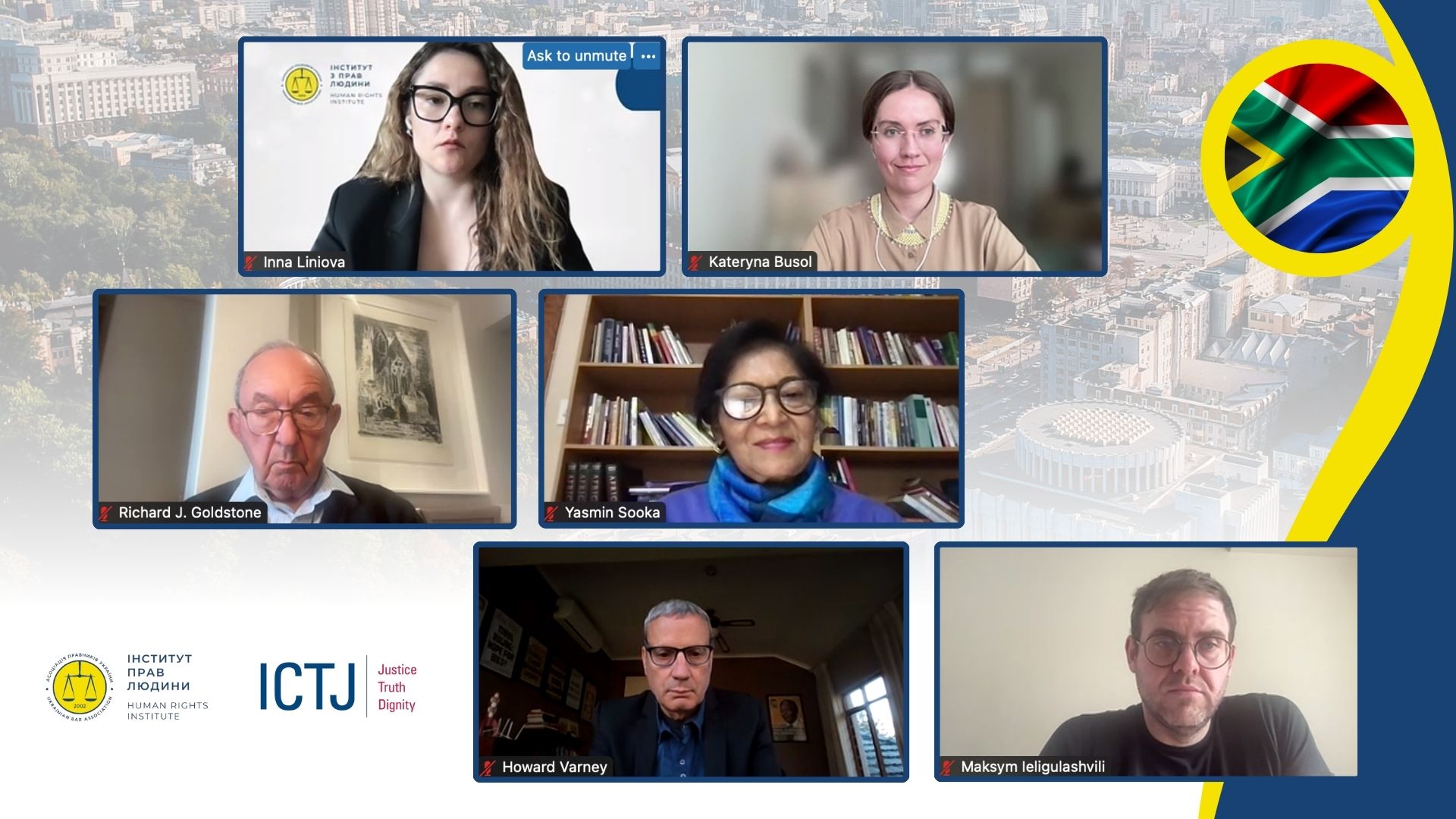South Africa: Lessons of Truth and Reconciliation for Ukraine
On May 27, the Human Rights Institute of the Ukrainian Bar Association (UBA HRI), in partnership with the International Center for Transitional Justice (ICTJ), held the first webinar in a series dedicated to the international experience of transitional justice.
Studying international practices in transitional justice is critically important for Ukraine. In particular, the case of South Africa represents an effort to overcome the deep consequences of apartheid through truth-telling, conditional amnesty, reparations, and victim participation. The Truth and Reconciliation Commission (TRC), established in 1995, was mandated to investigate gross human rights violations, facilitate amnesties, and clarify the fate of the disappeared. However, this process also revealed several risks — including the lack of political will to hold perpetrators accountable, insufficient institutional reforms, and a limited approach to addressing socio-economic inequality. Thus, the South African experience offers both inspiration and caution, emphasizing the need for a comprehensive approach to truth, justice, and reconciliation.

During the event, participants explored complex but highly relevant questions for Ukraine: how to reconcile truth and accountability in transitional justice; whether amnesty in exchange for truth can be an acceptable compromise; the role of public storytelling, memory, and cultural practices in reconciliation; and whether justice is possible without strong and independent institutions.
The discussion was moderated by Inna Linyova, Director of the UBA Human Rights Institute, and Kateryna Busol, Legal Adviser at ICTJ. The speakers included:
- Richard J. Goldstone, Judge of the Constitutional Court of South Africa (1994 - 2003), Former Chief Prosecutor of the United Nations International Criminal Tribunals for the former Yugoslavia and Rwanda
- Yasmin Sooka, former Executive Director of the Foundation for Human Rights in South Africa, a former member of the Truth and Reconciliation Commission
- Howard Varney, Senior Expert, ICTJ
- Maksym Ieligulashvili, expert, 5 a.m. Coalition
Inna Linyova opened the event by emphasizing its mission — to reflect on international transitional justice experience and support Ukrainian legal professionals in this process. Kateryna Busol highlighted the importance of the webinar series as a platform for knowledge exchange and joint problem-solving in the context of Ukraine’s realities since 2014.
Richard J. Goldstone urged participants not to copy foreign models but to adapt them to the Ukrainian context. He shared his experience with the International Criminal Tribunal for the former Yugoslavia, pointing to the challenges of achieving reconciliation despite legal successes. According to him, South Africa's experience is valuable but requires critical analysis.
Yasmin Sooka gave a detailed account of the compromise model of conditional amnesty in exchange for truth. She emphasized the importance of involving civil society and religious leaders, such as Archbishop Desmond Tutu, in creating a legitimate reconciliation process. Her insights shed light on the mechanisms that allowed South African society to address the past without resorting to armed revenge.
Howard Varney focused on the role of lawyers in transitional justice processes. He noted that even the best institutional solutions lose their effectiveness without genuine political will. In South Africa, the government failed to implement the TRC’s recommendations on accountability, undermining victims’ trust. He stressed that the role of lawyers goes beyond legal support — it includes persistent advocacy and case-building, even in the face of state resistance.
“Transitional justice in Ukraine did not start from scratch in 2014,” Maksym Ieligulashvili reminded. The state already had institutions and policies relevant to this process: the Institute of National Remembrance, legislation on victims of communist repression, and programs for those affected by the Chernobyl disaster. He stressed the importance of building on existing experience to avoid turning the country into a testing ground for external experiments.
Maksym also highlighted the loss of public trust in law enforcement after its brief rise in 2022. In his view, relying solely on law enforcement to deliver justice is risky. Transitional justice must be multidimensional, encompassing institutional reform, social cohesion, memory, and reparations.
In the final block, participants shared common conclusions:
-
Emphasis was placed on the danger of implementing foreign models without adaptation.
-
It was underscored that responses to crimes must be timely and systematic.
-
It was noted that justice for Ukraine also represents a challenge for the international legal order.
This first webinar became a significant step toward shaping Ukraine’s approach to transitional justice — informed by international experience and the country’s unique historical context.
